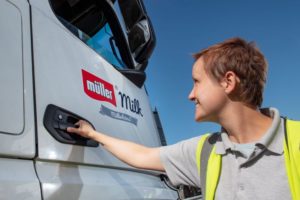
Some technicians feel more comfortable working beneath a bus or truck that is supported by solid ground, as well as the fact it is quick and convenient to drive or roll a vehicle over a pit.
However, others think of a dark underground space with crumbling walls and a leaking floor – a place with poor ventilation that workers call fall into.
According to Steve Braund, marketing manager at workshop equipment specialist Totalkare, despite the huge strides forward in technology and safety measures, some people are still stuck with the out-dated image of what working in a pit is like.
He said: “Today’s vehicle inspection pits are a carefully calculated structural installation, braced for strength and durability with the strongest materials, built to last and from the ground up with lighting, ventilation, and the safety of your workforce in mind.
“Just like any other equipment you use in your workshop, a vehicle inspection pit is only as safe as the people who use it – and you need the right preparation and measures in place to create a safe working environment for your people.”
Proponents of heavy-duty vehicle lifts say these enable work to be carried out on vehicles in a more open environment, with easy access from all sides.
Mobile column lifts can also be moved out of the way when not in use and the latest cable free models further reduce the risk of trips and falls.
Shropshire-based Renault Trucks and Accident repair centre Perry’s of Gobowen recently expanded its vehicle lifting capabilities with additional cable-free T8DC Totalkare mobile column lifts.
The agreement is supported by a full repair and maintenance package – including two service visits a year and Reports of Thorough Examination.
Braund said his company’s CPD-certified online training programme can also take transport operators through the key learning, best practices and safety checks for the correct operation of mobile column lifts in the workplace – from video tutorials and instructional guides to multiple-choice tests across several different modules.
He added: “With a mobile column lift, you’ve got the flexibility to raise vehicles exactly where you need them – in workshops, garages, or outdoor spaces.
“And that flexibility and freedom is probably the reason you bought one. But it comes with extra responsibility – and you need to be sure you’re setting up your lifts in a position and environment that’s safe for you and your team.
“Working with heavy machinery always comes with a risk. But with the right training, you can give your people the knowledge and experience they need to make your workshop as safe as it can possibly be.”
Stertil Koni also recently supplied two sets of heavy-duty type ST1075FWA wireless mobile column lifts to Preston-based Iveco, Isuzu and Fiat Professional dealer Walton Summit Trucks to make best use of workshop space during servicing and repair operations.
There are a total of eight columns used in Walton Summit Trucks’ workshop and in practice, this provides the flexibility to use the columns in groups of four, six or eight depending on the size and weight of vehicles to be lifted.
Patrick O’Leary, Service Manager at Walton Summit Trucks said: “The new wireless Stertil Koni column lifts are vital to our operation and we use them around the clock. Also, apart from their space-saving advantages, the most important feature is the safety element.
“We use the lifts for all major repairs and overhauls on a range of vehicles including 3.5 tonne vans, 44 tonne tractor units, 32 tonne 4-axle vehicles and, on occasions, semi-trailers.
“These vehicles represent a diverse range of customers who all need our workshop to be available 24/7. That’s when the combination of reliability and ease of use is particularly important.”
Meanwhile, over the last nine years Premier Pits, based in Quadring, Lincs, has been the primary supplier of steel inspection pits to both Scania (Great Britain) and its independent dealer network.
About 85 pits have been installed in Scania’s captive workshops around the country and the truck manufacturer says it has been “consistently impressed by the quality of the product and level of service.”
James Armstrong, Scania (Great Britain) Limited said: “All installations have been carried out on a turn-key basis and the professionalism of Premier Pits during the process – and in co-operating with other contractors – is second to none.
“The company has also looked to make product improvements wherever possible; a good example can be found at the recently acquired SGB premises near Oxford, where a specially built wide-bodied pit was installed including the provision of safety lights and a stainless steel shelf.”
Also, Phoenix Truck and Trailer based near Heathrow Airport contacted workshop pit specialist Everquip, as the business had outgrown its current garage and wanted expert advice on how to make the best use of a much larger facility they were moving into.
Everquip carried out a full design of the layout and the job included the installation of twin ATF lanes, commercial vehicle brake testers, wheel play detectors, inspection lanes for HGVs as well as mobile column lifts.
Phil Sherman, Business Development Manager at Phoenix Truck & Trailer Maintenance said: “We used Everquip when designing and building our new workshop in Heathrow.
“Their knowledgeable friendly team were able to guide us every step of the way. They delivered a faultless installation to create a maintenance facility that we are very proud of.”
Deciding on the best method to work on your vehicles, whether pits or column lifts, is not an easy one – they all have their own advantages, and each one fits a specific purpose.
However, the UK has many experienced vehicle workshop experts that are on hand to supply and install every kind of vehicle lift and inspection pit there is, as well as provide top quality advice, training and support to help operators make the correct choice.










